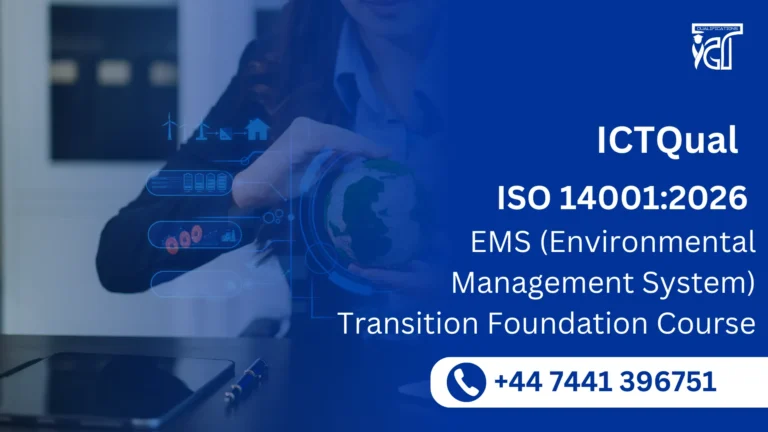The ICTQual Level 6 Diploma in Electrical Engineering 360 Credits – Three Years is a comprehensive three-year programme designed to equip learners with advanced technical knowledge and practical skills required in today’s dynamic electrical engineering sector. With a robust 360-credit framework, this diploma provides in-depth understanding across core and specialised areas, making it suitable for both freshers and experienced professionals seeking career growth.
Learners undertaking this diploma will gain expertise in electrical systems design, power distribution, automation, and sustainable energy solutions. Through hands-on projects, analytical problem-solving, and exposure to industry-standard technologies, they develop the confidence and competence necessary to excel in diverse engineering roles. Additionally, the programme enhances critical thinking, project management, and technical communication skills, all highly valued in modern engineering environments.
Upon completion, learners can pursue careers as electrical engineers, project managers, systems designers, or consultants across a wide range of industries, including energy, manufacturing, and construction. The programme not only opens pathways to managerial and technical leadership roles but also positions learners to contribute to innovative and sustainable engineering solutions globally.
Key benefits of the diploma include mastery of advanced electrical engineering concepts and practical applications, enhanced employability, hands-on experience with contemporary engineering tools, development of critical analytical and problem-solving skills, and preparation for leadership roles in technical and engineering projects.
Whether learners are starting their professional journey or seeking to elevate their existing expertise, the ICTQual Level 6 Diploma in Electrical Engineering provides a solid foundation for long-term career success. It equips learners with the knowledge, skills, and confidence to thrive in the global engineering landscape.
ICTQual Level 6 Diploma in Electrical Engineering 360 Credits – Three Years
This qualification, the ICTQual Level 6 Diploma in Electrical Engineering 360 Credits – Three Years, consists of 36 mandatory units.
Year 1: Foundational Knowledge
- Engineering Mathematics I
- Fundamentals of Electrical Circuits
- Principles of Electronics
- Digital Logic Design
- Electrical Machines and Transformers
- Introduction to Control Systems
- Engineering Drawing and CAD
- Introduction to Microprocessors and Microcontrollers
- Electrical Measurement and Instrumentation
- Physics for Engineers
- Health and Safety in Engineering
- Sustainability in Electrical Engineering
Year 2: Intermediate Proficiency
- Engineering Mathematics II
- Power Systems Analysis
- Analog Electronics
- Embedded Systems and Applications
- Electrical Energy Systems
- Signals and Systems
- Principles of Automation and Robotics
- Industrial Electronics
- Communication Systems Engineering
- Renewable Energy Technologies
- Electrical Project Management
- Technical Report Writing and Research Methods
Year 3: Advanced Specialization and Application
- Advanced Power Electronics
- Smart Grid Technology
- Electrical Machine Design
- Advanced Control Systems
- High Voltage Engineering
- Instrumentation and Process Control
- Advanced Embedded Systems
- Energy Storage and Conversion Systems
- Wireless and Optical Communication
- Electromagnetic Compatibility
- Capstone Project
- Professional Development and Ethical Practices
Learning Outcomes for the Level 6 Diploma in Electrical Engineering 360 Credits – Three Years:
Year 1: Foundational Knowledge
Engineering Mathematics I
- Apply fundamental mathematical concepts such as calculus, algebra, and trigonometry to solve engineering problems.
- Utilize mathematical tools to model and analyze simple electrical and electronic systems.
Fundamentals of Electrical Circuits
- Analyze electrical circuits using basic laws and theorems, such as Ohm’s Law and Kirchhoff’s Laws.
- Design and simulate basic electrical circuits for practical applications.
Principles of Electronics
- Understand the operation of basic electronic components such as diodes and transistors.
- Apply principles of electronics to design simple amplifiers and rectifiers.
Digital Logic Design
- Develop logic circuits using combinational and sequential design techniques.
- Use truth tables and Karnaugh maps to simplify and optimize digital circuits.
Electrical Machines and Transformers
- Explain the working principles of electrical machines and transformers.
- Perform calculations to determine the performance parameters of these devices.
Introduction to Control Systems
- Understand the fundamental concepts of control systems, including feedback and stability.
- Design simple control systems using proportional, integral, and derivative (PID) controllers.
Engineering Drawing and CAD
- Create accurate engineering drawings using traditional and computer-aided design (CAD) tools.
- Interpret and produce technical drawings for electrical and electronic components.
Introduction to Microprocessors and Microcontrollers
- Understand the architecture and operation of microprocessors and microcontrollers.
- Develop basic programs to control hardware systems using microcontrollers.
Electrical Measurement and Instrumentation
- Use measurement tools and instruments to quantify electrical parameters like voltage, current, and resistance.
- Evaluate the accuracy and reliability of electrical measurement systems.
Physics for Engineers
- Apply fundamental physics concepts, such as electromagnetism and mechanics, to engineering scenarios.
- Solve problems involving energy, force, and motion in electrical systems.
Health and Safety in Engineering
- Identify potential hazards in engineering environments and implement appropriate safety measures.
- Understand and comply with health and safety regulations in engineering practice.
Sustainability in Electrical Engineering
- Evaluate the environmental impact of electrical engineering solutions and processes.
- Incorporate sustainable practices and energy-efficient designs into engineering projects.
Year 2: Intermediate Proficiency
Engineering Mathematics II
- Apply advanced mathematical methods, such as differential equations and complex numbers, to solve engineering problems.
- Use numerical techniques to analyze electrical and electronic systems.
Power Systems Analysis
- Analyze power generation, transmission, and distribution systems.
- Use computational tools to evaluate the performance and stability of power systems.
Analog Electronics
- Design and analyze analog circuits, including oscillators and amplifiers.
- Understand the operation of integrated circuits in practical applications.
Embedded Systems and Applications
- Design and program embedded systems for specific applications.
- Integrate hardware and software components for efficient system operation.
Electrical Energy Systems
- Understand the principles of electrical energy generation, conversion, and distribution.
- Evaluate the performance and efficiency of different energy systems.
Signals and Systems
- Analyze signals and their transformations in time and frequency domains.
- Design and implement basic signal processing techniques.
Principles of Automation and Robotics
- Understand the fundamentals of automation and robotic systems.
- Design and simulate simple robotic systems using basic control techniques.
Industrial Electronics
- Design and analyze circuits used in industrial applications, such as power electronics and drives.
- Understand the role of electronic systems in industrial automation.
Communication Systems Engineering
- Understand the principles of analog and digital communication systems.
- Analyze the performance of communication systems under different conditions.
Renewable Energy Technologies
- Evaluate the working principles and applications of renewable energy systems.
- Design basic renewable energy solutions, such as solar and wind power systems.
Electrical Project Management
- Plan and manage electrical engineering projects, including resource allocation and scheduling.
- Apply project management tools to ensure successful project completion.
Technical Report Writing and Research Methods
- Develop technical writing skills for documenting research and project findings.
- Use research methods to solve engineering problems and present results effectively.
Year 3: Advanced Specialization and Application
Advanced Power Electronics
- Design and analyze advanced power electronic converters and systems.
- Understand the applications of power electronics in renewable energy and industrial automation.
Smart Grid Technology
- Analyze the components and functionality of smart grid systems.
- Develop solutions for integrating renewable energy sources into the smart grid.
Electrical Machine Design
- Apply design principles to develop efficient and reliable electrical machines.
- Evaluate the performance of machine designs under different operating conditions.
Advanced Control Systems
- Design and implement advanced control strategies for dynamic systems.
- Use computational tools to simulate and optimize control system performance.
High Voltage Engineering
- Understand the principles of high voltage generation and insulation.
- Analyze the behavior of high voltage systems under various conditions.
Instrumentation and Process Control
- Design and implement advanced instrumentation systems for industrial applications.
- Apply process control techniques to maintain system stability and efficiency.
Advanced Embedded Systems
- Develop complex embedded systems using advanced programming and hardware techniques.
- Integrate sensors and actuators for real-time control applications.
Energy Storage and Conversion Systems
- Evaluate the performance of energy storage technologies, such as batteries and supercapacitors.
- Design systems for efficient energy storage and conversion.
Wireless and Optical Communication
- Understand the principles and technologies behind wireless and optical communication systems.
- Analyze the performance of communication systems in different environments.
Electromagnetic Compatibility
- Identify and mitigate electromagnetic interference in electrical and electronic systems.
- Design systems to meet electromagnetic compatibility standards.
Capstone Project
- Apply theoretical and practical knowledge to design and implement a comprehensive engineering project.
- Demonstrate project management, teamwork, and problem-solving skills.
Professional Development and Ethical Practices
- Understand the ethical responsibilities of an electrical engineer and the importance of professionalism.
- Develop strategies for continuous learning and career growth in the engineering field.
The ICTQual Level 6 Diploma in Electrical Engineering offers learners a wealth of benefits that extend beyond technical knowledge. This programme is designed to enhance employability, develop leadership potential, and provide practical skills that are directly applicable to real-world engineering challenges. By completing this diploma, learners gain a competitive edge in the global job market and are well-prepared for diverse career paths in electrical engineering and related fields.
1. Advanced Technical Expertise
- Comprehensive understanding of electrical systems, circuits, and power distribution
- Proficiency in automation, control systems, and renewable energy technologies
- Ability to apply engineering principles to complex real-world problems
2. Career Progression and Employability
- Enhanced prospects for roles such as electrical engineer, project manager, or consultant
- Eligibility for senior and managerial positions within engineering teams
- Recognition of skills and knowledge by employers across multiple industries
3. Practical and Hands-On Learning
- Experience with industry-standard tools, software, and technologies
- Completion of projects that simulate real engineering challenges
- Development of practical problem-solving and analytical skills
4. Leadership and Management Skills
- Training in project management, team coordination, and technical communication
- Ability to lead engineering projects and manage resources effectively
- Preparation for supervisory and strategic roles in organisations
5. Global Career Opportunities
- Exposure to international engineering standards and best practices
- Opportunities to work in diverse industries such as energy, manufacturing, and construction
- Strong foundation for lifelong learning and continuous professional development
The ICTQual Level 6 Diploma in Electrical Engineering is designed for learners who are motivated to build a successful career in the electrical engineering sector. It caters to both freshers seeking a strong foundation and professionals aiming to advance their expertise and take on leadership roles. Learners who enrol in this programme are expected to demonstrate a commitment to developing technical skills, critical thinking, and practical problem-solving abilities.
1. Aspiring Electrical Engineers
- Individuals starting their career in electrical engineering
- Learners seeking comprehensive technical knowledge and practical skills
- Those aiming to secure entry-level engineering positions with strong career growth potential
2. Working Professionals Seeking Advancement
- Engineers looking to enhance their qualifications and expertise
- Professionals aiming for managerial or supervisory roles in engineering projects
- Those seeking to specialise in areas such as power distribution, automation, or renewable energy
3. Career Switchers
- Individuals from related technical backgrounds wanting to transition into electrical engineering
- Learners looking to gain industry-recognised credentials and practical experience
4. Lifelong Learners
- Individuals committed to continuous professional development
- Learners interested in staying updated with industry standards, emerging technologies, and best practices
5. Globally-Minded Professionals
- Those aspiring to work in international engineering environments
- Learners who value transferable skills applicable across multiple industries and countries
Completing the ICTQual Level 6 Diploma in Electrical Engineering 360 Credits – Three Years opens a wide range of career and academic progression opportunities. Learners gain the knowledge, skills, and professional credibility needed to advance in technical, managerial, and specialised engineering roles. This diploma serves as a stepping stone for both industry success and further academic qualifications.
1. Senior Engineering Roles
- Progress to positions such as Senior Electrical Engineer or Lead Engineer
- Take on responsibility for designing, implementing, and managing complex electrical systems
- Lead technical teams on large-scale projects
2. Project Management Opportunities
- Transition into project management or supervisory roles within engineering teams
- Manage resources, budgets, and project timelines effectively
- Oversee engineering projects from planning to execution
3. Specialisation in Advanced Fields
- Develop expertise in renewable energy, automation, or industrial control systems
- Pursue specialised roles in energy efficiency, smart grid technology, or electrical safety
- Enhance technical knowledge for consultancy or advisory positions
4. Academic and Professional Advancement
- Serve as a foundation for further studies, including postgraduate degrees or professional certifications
- Expand knowledge in cutting-edge electrical engineering technologies and research
- Build credentials recognised by employers and industry professionals
5. Global Career Opportunities
- Work with international engineering firms across energy, manufacturing, or construction sectors
- Access career opportunities in countries with high demand for skilled electrical engineers
- Apply transferable skills in diverse industrial environments worldwide
Route for Candidates with No Experience
This route is designed for learners who are new to the electrical engineering field and have no prior work experience. The process is as follows:
- Admission: Learners enrol in the programme at an ICTQual Approved Training Centre.
- Training: Learners complete structured training covering all essential study units. This includes both theoretical instruction and practical exercises to build foundational skills.
- Assessment: Learners are required to complete assignments that reflect the course’s learning outcomes. These assessments evaluate their understanding and practical application of the course material.
- Certification: Upon successful completion of all assignments and assessments, learners are awarded the ICTQual Level 6 Diploma in Electrical Engineering.
Route for Experienced and Competent Candidates
This route is for learners who already have relevant work experience in the electrical industry and wish to gain formal recognition. The process includes:
- Eligibility: Candidates must have a minimum of six years of verified experience in electrical engineering or a related field, with work directly relevant to the qualification’s learning outcomes.
- Assessment of Competence: Candidates are not required to complete the full training programme. The ICTQual Approved Training Centre assesses their existing knowledge and skills against the course learning outcomes.
- Evidence Submission: Candidates must provide documentation demonstrating their experience, including details of roles, responsibilities, and tasks performed that align with the course requirements.
- Knowledge Verification: Centres ensure that candidates are familiar with all learning outcomes. If needed, a skills gap assessment identifies areas requiring additional learning.
- Certification: Once experience and competence are verified, candidates are awarded the ICTQual Level 6 Diploma in Electrical Engineering without completing the full training course.
Both routes provide a flexible pathway for learners, ensuring they either acquire essential knowledge through training or have their existing expertise formally recognised. This approach supports both newcomers and seasoned professionals in achieving the ICTQual Level 6 Diploma in Electrical Engineering.
Entry Requirements
The ICTQual Level 6 Diploma in Electrical Engineering is designed to accommodate both new learners and experienced professionals. To ensure learners are prepared for the programme, the following entry requirements must be met:
1. Minimum Age
- Learners must be at least 18 years old at the time of enrolment.
2. Educational Background
- Learners should have completed a Level 5 or equivalent qualification in Electrical Engineering, Electronics, or a related technical field.
- Alternatively, learners with strong practical experience in the electrical engineering sector may be considered.
3. Work Experience
- For the route designed for experienced candidates, learners must have a minimum of six years of verified work experience in electrical engineering or a closely related field.
- Fresh learners with no prior experience can enrol via the standard training route and complete all required study units and assignments.
4. Language Proficiency
- Learners must demonstrate proficiency in English, both written and spoken, to engage effectively with course materials and complete assessments.
- This can be evidenced through prior qualifications, professional experience, or a recognised English language test.
5. Centre Requirements
- Learners must enrol through an ICTQual Approved Training Centre.
- The centre is responsible for providing access to course materials, practical training, guidance, and assessment in line with ICTQual standards.
These entry requirements ensure that all learners, whether new or experienced, are adequately prepared to successfully complete the ICTQual Level 6 Diploma in Electrical Engineering and gain the skills, knowledge, and recognition necessary for career progression in the field.
Register Now
Qualification Process
Qualification Process for the ICTQual Level 6 Diploma in Electrical Engineering 360 Credits – Three Years
- Self-Assessment:
Begin by evaluating your eligibility to ensure you meet the qualification requirements, including work experience, knowledge, and language proficiency. - Registration:
Complete your registration by submitting the required documents, including a scanned copy of a valid ID, and paying the registration fee. - Induction:
An assessor will conduct an induction to confirm your eligibility for the course and explain the evidence requirements. If you do not meet the criteria, your registration will be cancelled, and the fee will be refunded. - Assignments & Evidence Submission:
Provide all assignments and the necessary evidence based on the assessment criteria outlined in the course. If you are unsure of the required evidence, consult with the assessor for guidance on the type and nature of evidence needed. - Feedback and Revision:
The assessor will review your submitted evidence and provide feedback. Evidence that meets the criteria will be marked as “Criteria Met,” while any gaps will be identified. You will be asked to revise and resubmit if needed. - Competence Evidence:
Submit final evidence demonstrating that all learning outcomes have been met. This evidence will be marked as “Criteria Met” by the assessor once it is satisfactory. - Internal Quality Assurance (IQA):
The Internal Quality Assurance Verifier (IQA) will review your evidence to ensure consistency, quality, and compliance with standards. - External Verification:
The IQA will submit your portfolio to ICTQUAL AB External Quality Assurance Verifiers (EQA) for final confirmation. The EQA may contact you directly to verify the authenticity of your evidence. - Certification:
Upon successful completion of all checks, ICTQUAL AB will issue your official certificate, confirming that you have attained the ICTQual Level 6 Diploma in Electrical Engineering 360 Credits – Three Years.







